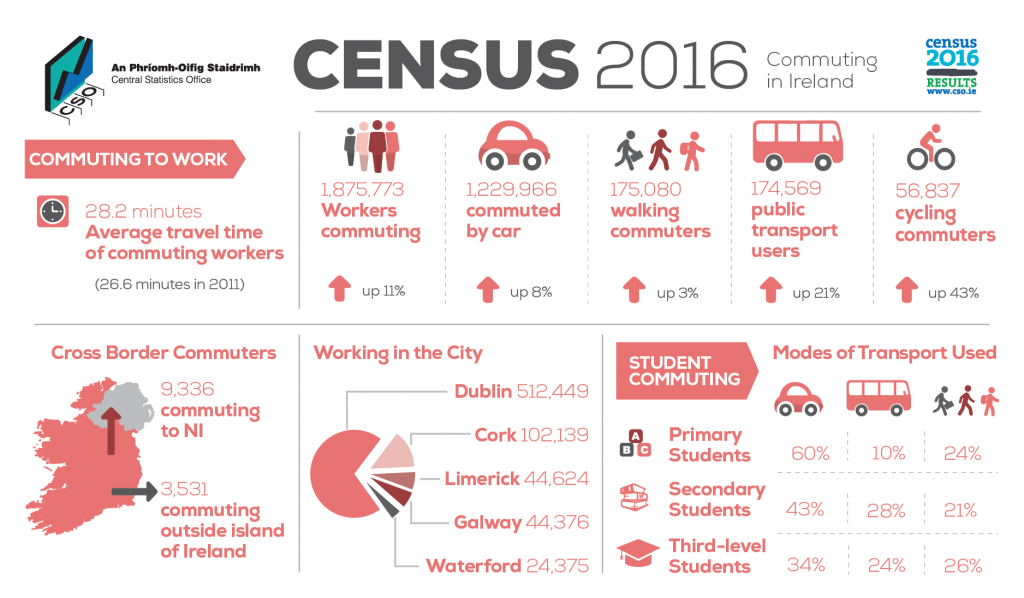Commuting in Ireland report: long way to go for sustainable transport

September 7th, 2017
New commuting figures released by the Central Statistics Office (CSO) last week contained some good news for the environment, but also demonstrated that much more needs to be done to encourage commuters to make more sustainable transport choices.
Using data from Census 2016, the Commuting in Ireland report finds that the numbers travelling by public transport, bike or walking has increased significantly since 2011.
However, the report also points to the continued dominance of private cars among the three million commuting daily to work, college or school across the country.
Private Car Dominance
Just over 65 per cent of workers either drove or were passengers in a car (an increase of 8 per cent on 2011), while almost 60 per cent of primary school students and 43 per cent of secondary school students travelled to school by car.
The fact that the private car remains the most common mode of transport in 2016 by a large margin is cause for concern for both the environment and human health.
There were also large regional variations in the number of commuting workers choosing public transport or cycling over the car, although there was a clear fall in number in rural areas.

In Dublin city and suburbs, just under half of working commuters travelled by car. This figure jumped to over six in ten people in the cities and suburbs of Limerick and Cork. In rural areas, it rose to seven in ten people.
City Cycling
While the number of commuting workers using public transport or cycling had increased overall (cycling showed a huge 43 per cent increase on five years ago), this growth was heavily concentrated in Dublin city and suburbs.
Two-thirds of all commuting cyclists were based in this area (38,870 people), while 2,330 people cycled to work in Cork, 1,874 in Galway, 968 in Limerick, and just 395 in Waterford.
Comparing the 2016 commuting figures with those of 1986 paints an even more dismal picture. Thirty years ago, 22 per cent of commuters cycled or walked to work, compared to just 12 per cent in 2016.
In 1986, 50 per cent of primary school commuters walked or cycled to school. In 2016, those walking or cycling accounted for just 25 per cent of primary school students.
This continued heavy reliance on the private car is unfortunate news at a time when air pollution is increasingly being linked with illness and deaths as traffic emissions rise.
Emissions Risk
The nitrogen oxide emissions produced by traffic are considered a major environmental health risk by the World Health Organisation, which estimates that over 400,000 premature deaths are attributable to poor air quality in Europe annually.
In recent months, several countries, including France, Scotland and Norway, have announced plans to phase out petrol and diesel vehicles within the next two decades because of the environmental and human health risks associated with them.
Here in Ireland, Anne Graham, chief executive of the National Transport Authority (NTA), this week warned the Government’s Climate Council that the NTA does not have enough funds to move commuters away from emissions-producing cars towards public transport, bikes and footpaths.
If worsening air pollution and damage to the environment and human health are to be mitigated, the Government urgently needs to take steps to invest in improved public transport services in urban and rural areas alike, as well as better infrastructure for cycling and walking.
[x_author title=”About the Author”]







